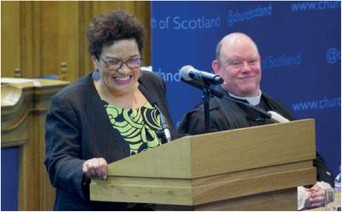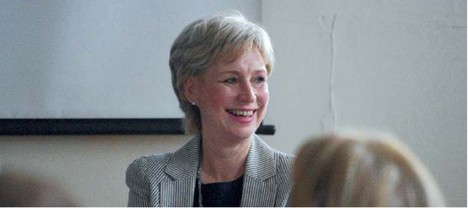Jackie Macadam offers a flavour of some of the events that made up this year's Fringe at the General Assembly of the Church of Scotland.
HAVING started off in some style, there was something of a subdued atmosphere at the Assembly after the Manchester bombing and a planned election hustings was cancelled.
Monday’s fringe event was all a bit grey (not unlike the weather to be honest) but in this case it was thanks to the first Crossreach Grey Cake Challenge, a delightful contest between the Moderator of the General Assembly of the Church of Scotland – the Right Rev Dr Derek Browning, and the Moderator of the National Youth Assembly, Mr Andrew MacPherson.
The unveiling of the cakes – grey on the outside and rainbow on the inside – during the Crossreach fringe event, were to show that depression can be like grey cloud wrapped around a bright and vibrant person and that sometimes you need to cut through that grey cloud in order to release the person trapped inside.
Tuesday saw a presentation by Sally Magnusson about her charity, ‘Playlist For Life’ and the impact a personalised playlist can have on a person with dementia.
We’ve all experienced the ‘flashback’ when a song comes on the radio and immediately takes us back to a time and a place in our memory when we heard the song on a particular occasion.
That ‘flashback’ ability of music seems to help those with dementia access memories that they had previously lost the ability to connect with – and in doing so, can help them begin to reconnect not just with the person they once were but with their family now.
After a moment’s silence to remember and think about the victims in the Manchester attack, a lively discussion followed the presentation, and how the personalisation – that is, the selection of music that might be relevant in a particular way – to the person with dementia. To that end the charity now has a community officer who can be contacted directly for information, help and even assistance to build a playlist for an affected individual.
Tuesday afternoon also saw a presentation by the Scots Makar, Jackie Kay and Sam Wells, vicar of St Martin’s-inthe-Fields, London.
Some beautiful, personal poetry by Jackie was backed by a deeply personal expression of Kingdom Churches by Sam, talking about the experiences of working with young people from across the world and their contribution to his church life.
“If you are looking for your cornerstone,” he said, “you will find it among the stones the mason has cast aside, because it is there, among the rejected, you will find your cornerstone.”
After his talk, it was noticeable that some members of the audience wanted a copy of the speech, so moved had they been by it. This was followed by the Guild’s popular ‘Big Sing’ which raised £2973.52 for the Livingstonia Aids Project in Malawi.
On Wednesday I decided to go to see what the Mission and Discipleship Council are doing to help and encourage churches to embrace the learning disabled members of their parish more fully into the church – and I found out the answer was ‘quite a lot really’.
It’s not just about making room for a wheelchair or two. It can be as simple as projecting visual aids in advance of what’s about to happen during the sermon – an image of praying hands when a prayer is coming up or some notes on screen when everyone is about to sing.
A varied audience watched some people who had benefitted from taking part in not just special groups being held in their churches, but also in the actual service.
“I really enjoy helping out,” said one lady, Lyndsay, one of the people featured in the promotional materials and the advice pack. “I really feel that I belong.”
As Donald Trump would say: “That’s a beautiful thing.”
And it is. We’ve gone through the hard and expensive bit. We’ve changed the church buildings, put in ramps, altered toilets. Now, with the fantastic work the Learning Disabilities working Group is doing, we can get on with the job of welcoming people to join the body of the church service, or find someone in the congregation interested in setting up a Prospect group or even just be prepared to be a go-between so that the work the Group is doing can be given to your church – the advice, the help, the spreading of information and ideas that could help in your church.
The working group has made a very conscious decision to move around Scotland and meet people that they are working with. That’s inclusivity – and something we should all aspire to.
On Thursday at lunchtime the venue was St Columba’s-by-the-Castle and the celebration of women in the church by the World Mission Council.
They had three brilliant speakers from a fair representation of the world – Asia, Europe and Africa.
From Asia, a woman with a real mission – senior pastor Yie-Shik Kim from the Presbyterian Church of Korea – or ‘Dr Kim’ as everyone calls her.
She gave a brief introduction to the church in Korea and spoke about the difficulties of being in such close proximity to Christians in North Korea, people they would love to have contact with but for whom that was illegal.
Dr Kim explained that gender-equality was a topic on the rise in her church and that as part of the gender equality committee, she was on the case!
The Rev Guiseppina Bagnato from the Waldensian Church in Tavola Valdese, Italy, spoke next. Some background to her particular church told everyone that it was partly because of their very early treatment of men and women within the church as equals that had at least in part, led to them being declared heretical at one point in their history!

Mission and Discipleship Learning Disabilities Working Group presentation
Photos: Jackie Macadam
She spoke in part about the refugee crisis in Lampedosa and Sicily and spoke about the churches there who were working with the refugees were being helped by people from all religions and none.
“If it were not for the Muslims who came to help, we would not have had the translators in many cases that have helped us get the refugees the help they needed so quickly.
“But the help the refugees need is not just immediate – it is long-term as well. Help to enable them to find ways they can fit in afterwards. One man who arrived with his pregnant wife and small child was a barber to trade – a job he could do anywhere. But as a result of a bombing attack, he’d lost his right hand. We needed help long-term to find a way he could feel useful and respected again.”
The final speaker was the Rev Boitumelo Johanna Gabrone from the Uniting Presbyterian Church in Southern Africa.
She spoke of the need for identity and recognition.

Jackie Kay, Scots Makar
“Most people call me Johanna,” she says. “Mainly because they find my name, Boitumelo, too hard to pronounce, and that’s indicative of a way that people’s identity is changed to make them fit in with a system that finds it too difficult to let us be us.
“My church has been ordaining women since 1975,” she said. “And it is a church that is predominantly female – say around 80% – and yet time and again, because of the way women are brought up, we find ourselves waiting for permission to speak or offer an opinion.

Sally Magnusson ‘Playlist For Life'
“When I see a bunch of women working together, it is dynamic. Things get done. Look at your Guild. It works magic. That is the way women work together. But as soon as we are put into a group or a session with men, there are different behaviours. We wait our turn – or whatever the men will give us. We stop offering opinions and pushing our ideas.
“In many ways my church is a church run by women who don’t know they are running it!”